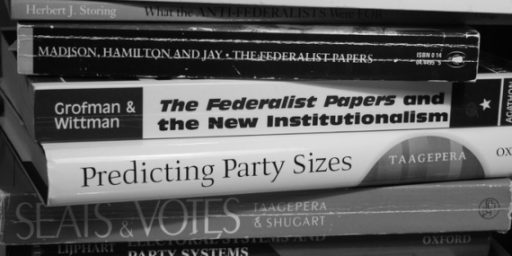Once Again to Madison and Republics
The saga continues.

If one is trying to attract my attention on a Sunday morning, especially one in which I was already thinking about Federalist 22, one could do no better than the following headline at Memeorandum: A Response to Dougherty — What Did Madison Really Say About Majorities? (Yes, I probably have a problem).
The piece is from John Ganz’s substack and it part of an interchange between himself and National Review‘s Michael Dougherty. It is interesting to me because, well you did notice that it mentions Madison and republics, yes? That at least got me to click through, where I found an interesting conversation but mainly where I found Dougherty engaging in a typical misreading of Federalist 10 and Madison’s views on democracy. While admitting that this stuff is clearly catnip to me (I mean, I have admitted the problem, which is the first step of something), what really led to writing this post is the way in which all of it is highly relevant to contemporary politics.
The proximate cause of the Ganz-Dougherty interchange was this piece at FiveThirtyEight: How The Republican Push To Restrict Voting Could Affect Our Elections and a graph that some conservatives took exception to on Twitter (for example) earlier this week (I may come back to that piece, and the graph in question, in a later post). This lead to Ganz’s piece, Are Republicans still democrats? (which is, in my opinion, an extremely important question for contemporary politics). Dougherty responded with Conservative Notes on Democracy (which has the not especially comforting sub-title, “Are Republicans really anti-democratic? It’s complicated.”). Ganz then responded to that piece I linked above, A Response to Dougherty (with that irresistible, to weirdos such as myself at least, subtitle about Madison).
I am going to recommend all of the linked pieces, and I do not here intend to summarize or deal with all that is contained in the various essay in question. Indeed, since the pieces are written as almost a dialog between the two writers it would be silly to try and do so. I do think that the entire conversation is extremely relevant to our current political moment and worthwhile for anyone seeking to understand it.
I will say, however, that I am far, far (dare I say, far?) more sympathetic to Ganz’s position and while I find Dougherty to be engaging in a thoughtful way, his position underscores where even intellectual conservatives go wrong in this present moment and give cover to truly pernicious and damaging currents within broader conservative/Republican politics (some of which are new, and some of which have been around a rather long time).
I want to focus on this from Dougherty:
Conservative intellectuals today are more likely to turn to the Framers of the Constitution for their suspicions of democracy than to the post-war intellectuals. “Democracies have ever been spectacles of turbulence and contention; have ever been found incompatible with personal security or the rights of property; and have in general been as short in their lives as they have been violent in their deaths,” wrote Madison in Federalist No. 10.
Now, let me state that yes, Madison wrote that in Fed 10. And yes, many conservatives, intellectual and not, have used this and similar quotations from the Founders as evidence for their alleged rejection of majority rule/endorsement of minority-empowerment (as in the Electoral College) and as fuel for “it’s a republic, not a democracy.” After all, it is Madison himself who really is responsible for introducing the notion of the US as a “republic” and not a “democracy” (see various links here for more info).
Having said that, to use that quote from Fed 10 to address the question “are Republicans still democrats?” as asked by a 21st century writer based on polling and social science findings (the FiveThirtyEight piece) from 21st century researchers and reporters is, to be kind, problematic.
There really are only two interpretations of Dougherty’s (and others’) usage of that passage from Madison to justify anti-majoritarianism as a governing principle. One is that they don’t understand the usage of the term in context. Another is that they are being dishonest about the term in context but they think that no one will notice. Both of these interpretations are harsh, I will readily allow (but I honestly see no other interpretations).
Let me note that regardless of which position is true, anyone who is using this quote, or other similar ones from Madison or other Founders about “democracy” is proceeding from a false premise. The very foundation of their position is sinking sand. This is really important to understand and acknowledge. If one’s first principles are this far off no wonder one can end up supporting minority rule. After all, Dougherty states in the quoted paragraph that “Conservative intellectuals today are more likely to turn to the Framers of the Constitution for their suspicions of democracy than to the post-war intellectuals” and then quotes Fed 10. But since that passage has nothing to do with contemporary usages of the term “democracy” it directly brings into question whether said conservative intellectuals have a reasoned basis for their suspicions.
I am going to assume that this is just a misunderstanding of the term in context (as opposed to knowing dishonesty) and proceed from there (and yes, I am rehashing, things I have been writing for years). Nevertheless, here we go:
First, one need go no further than the same exact paragraph from which Dougherty pulls his quote to see that Madison defined what he called “a pure democracy” as “a society consisting of a small number of citizens, who assemble and administer the government in person” and this is clearly what Madison is referring to with the term “democracy” in Dougherty’s quote. I am going to refrain from typing in bolded all caps here and note that there is no country on the face of the Earth that calls itself a “democracy” that is governed in such a fashion. And, further, when people, especially political scientists, use the term “democracy” they do not mean a situation wherein all the citizens meet together, in person, to administer government. At best, this is called a “direct democracy” and is a very rare, arguably non-existent, form of government.
Second, if one goes to the very next paragraph of Fed 10, one sees that Madison defines a “republic” as “a government in which the scheme of representation takes place” which is what almost all human beings think of when they say “democracy” as a description of a regime type that governs a country (a.k.a., “representative democracy”). He was even clearer, I would note, in Fed 14: “in a democracy, the people meet and exercise the government in person; in a republic, they assemble and administer it by their representatives and agents.”
Third, Madison and other Founders who spoke derogatorily of “democracy” were heavily influenced by Plato, Aristotle, Aquinas, Polybius, and others who spoke derisively about “democracy” which those thinkers all discussed as essentially mob rule by the poor. But that isn’t what the term means now, and really isn’t what it has meant for over two centuries now. (I discuss some of this in a little more detail here and here).
Fourth, it is utterly and totally clear what Madison thought was the core of republicanism, and it was majority rule. For example: “In republican Government the majority however composed, ultimately give the laws.” (Madison, Vices of the Political System of the United States, April 1787).
We can bookend that pre-Philadelphia Convention quote with one towards the end of his life, via Ganz, in his second piece:
Arguing against nullification in 1834, Madison writes, “…the amount of this modified right of nullification is, that a single State may arrest the operation of a law of the U. S. and institute a process which is to terminate in the ascendancy of a minority over a large majority, in a Republican System, the characteristic rule of which is that the major will is the prevailing ruling will.” (Emphasis once again mine.) I’m sorry, but this bears repeating: A REPUBLICAN SYSTEM, THE CHARACTERISTIC RULE OF WHICH IS THE MAJOR WILL IS THE PREVAILING RULING WILL.
Emphases his.
Let me add, Hamilton in Fed 22: “the fundamental maxim of republican government…requires that the sense of the majority should prevail.”
(One could go on, but one wants to wrap up this post).
Fifth, almost no one who advocates for majority rule-based democracy is arguing for unfettered, unconstrained majority rule. Almost without fail arguments for majority rule also assume minority rights and protections (you know, like “Congress shall make no law respecting an establishment of religion, or prohibiting the free exercise thereof” etc.). It is a strawman to assert that those who advocate for majority rule are advocating for the ability of the majority to do whatever they want as long as they have 50%+1. Quite clearly, no one* is arguing that a mere majority should be allowed to do absolutely anything they want to the minority–not even close.
And, I would add, that it is a pernicious and bizarre notion that the solution to the alleged tyranny of the majority is to give the minority more power than the majority (which is the basis of the question, “Are Republicans still democrats?” in the first place).
Because it is manifestly obvious that representative democracy has shortcomings, I often note that quote attributed to Churchill that “democracy is the worst form of government except doe the all that others that have been tried.” Madison had his own version of this in a letter to an unknown recipient late in his life (1834):
The result of the whole is that we must recur to the monitory reflection that no Government of human device, & human administration can be perfect; that that which is the least imperfect is therefore the best Govt. That the abuses of all other Govts. have led to the preference of Republican Govt. is the best of all governments because the least imperfect that the vital principle of Repub: Govt. is the lex majoris partis, the will of the majority; that if the will of a majority can not be trusted where there are diversified conflicting interests, it can be trusted no where because such interests exist every where; that if the manufacturing & agricultural interests, be of all interests the most conflicting in the most important operations of Govt. and a majority Govt. over them, be the most intolerable of Govts. it must be as intolerable within the States, as it is represented to be in the U. S; and finally that the advocates of the doctrine, to be consistent must reject it in the former, as well as in the latter; and seek a refuge under an authority master of both.
Human governance will ever be choosing between imperfect options and the goal is, therefore, to get at close to the least imperfect as you can.
As I stated in my post earlier today on Fed 22, I am not here engaging in a game of “proof text” wherein I am trying to win an argument via quote-off. But given that many defenders of the contemporary Republican turn toward minority rule use the Founders as their lodestar, it seems worth noting that they are wrong to do so.
And, beyond that, it is really important to note that they are simply incorrect in their own assessments of what democracy is and the allegedly virtues of minority rule.
There is more that could be said about Dougherty’s piece, but since Ganz addresses most of it, I will just stick with the above.
*Well, at least no one serious or significant. No doubt someone, somewhere on the internet is arguing everything. It is a real infinite number of monkeys with an infinite number of typewriters kind of situation.






Definitely cosign this. As to the main body of the post: Well, yeah.
Thanks Steven for these series of posts. I have learned a lot from them and the discussions they inspire.
James, if you’re reading, thanks to you as well.
But that’s at least similar to one of the common conservative talking points I’ve heard all my life: the poor are going to vote themselves bread and circuses. Specifically, the concerns seem to have always been that they will vote for things they want but can’t otherwise afford. Like nutritional security, healthcare, higher education. “Free Obamaphones” were a thing.
You graciously went with the misunderstanding interpretation of Dougherty’s use of Madison, but I’m going to go with dishonest.
The give-away comes from this line in Dougherty’s piece:
You see? If Democrats just tried harder to win the rural states, the anti-majoritarianism of the EC would just be a big nothing burger.
I also found his wrap-up a tell:
In this framing, true minority rule derives from those elitist, public-facing institutions that depend on the market or charitable contributions for their existence.
You couldn’t find two clearer markers of what Ganz notes is the prevailing Republican view: “the majority that rules is not fit to rule, it is not the real majority, or they are not the real Americans.”
That’s a pretty dumb comment. It’s not like Dem candidates are running around New York and California trying to build up a popular vote lead while ignoring the EC. The states that grant “the most advantage” are the large and medium-sized swing states which end up determining the election outcome every four years. If he’s suggesting that dems start campaigning in red states in hopes of flipping them the system as designed just doesn’t encourage that. Dem candidates are spending their time at exactly where our goofy system suggests they should.
President Madison’s leadership prevented total destruction of this country by the British in 1812.
FYI: this discussion continued via Greg Sargent in WaPo: link.